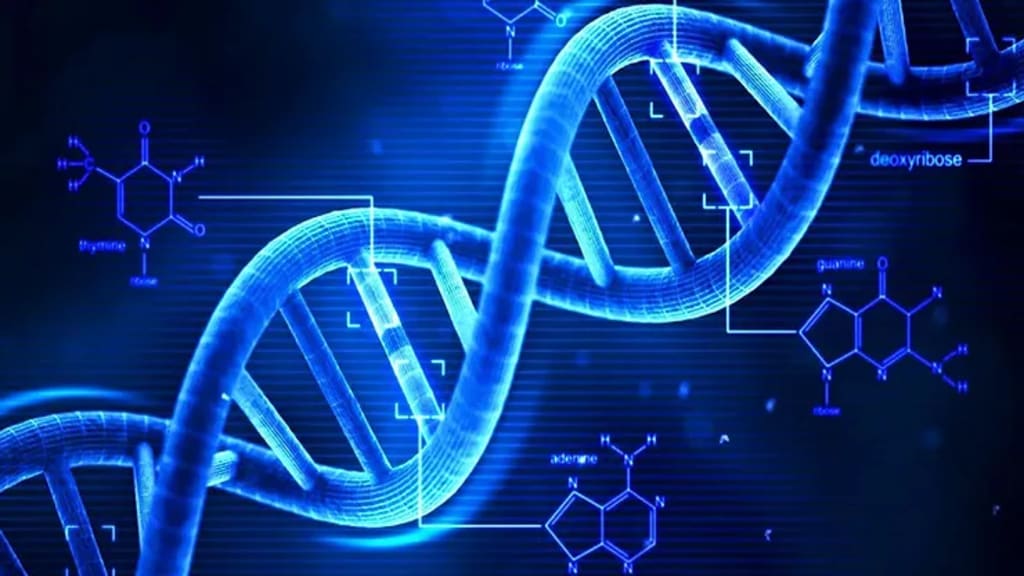Genetic Testing: Take Your Health to the Next Level
How to get started and what to consider

In this article you will learn:
- Why genes play a role in your health and why you should test them
- Where to get the best information on health strategies for your genes
- How to begin understanding the story of your genes
Lazy Reader’s Section:
Everyone has countless variation in their genetic makeup that affects everything from how you absorb nutrients, to the level of inflammation you produce or which substances do you harm or good. The answer to a comprehensive and customized nutrition plan is knowing the story of your genes, and I use Self Decode for their amazing wealth of information and lifetime access.
Lazy Author Alert:
Everything in this article is based on extensive research, but it is a summary of basic principles more than a presentation of that research. If you want the full, glorious nerdy version — grab yourself a copy of my book Dance Your Way Through Life: A No Bullshit Guide to Hacking Your Body, Mind & Soul for Success and dive into over 1,500 scientific references along with dozens of key genes to look up for nutritional status (like the popular VDR for vitamin D or MTHFR for B9) and healthy living.
The Details:
Although we mapped the human genome several years ago, this was a baby step forward in the greater scheme of understanding our biological machinery. Genetics is so complex, and we are barely starting to evaluate the relationships of certain genes to certain conditions. Still, today you have more power than ever to shape your biology through investigation and experimentation, and genetic testing is an affordable luxury in this department that simply didn’t exist a generation ago.
There are many reasons why understanding the story of your genes is a critical health step for everyone (in my opinion), and I will outline a few of them below:
1. Every nutrient has a genetic factor. Between how your body absorbs nutrients or transports them around, there are countless pathways, cell transporters, proteins, enzymes and other machinery that all work together to shuttle everything from vitamins and minerals to all the fancy antioxidants you’re putting into your body. The performance of each one of these pieces is determined by genes, and the point to take home is that each one of these steps can break down or come with a faulty blueprint — in which case your personal demand for nutrition can be totally different than the next person’s, not to mention the RDI which is often way off of what it takes to achieve optimal levels. A simple example is the VDR (vitamin D) gene. To get my levels up, I have to take 10,000 IU which is about 2500% of the RDI, but my VDR gene has several “SNPs” (single nucleotide polymorphisms) or basically kinks in the programming. Because every nutrient has multiple genes that regulate absorption and metabolism, this makes nutrition and supplementation a relatively subjective thing for everyone, hence why knowing the story of your genes is so important.
2. Genetic testing saves you time and money. Although there is an upfront cost (not that expensive if you consider a lifetime deal of information), genetic testing allows you to be smarter about everything from dietary choices to the supplements you put in your body. We are barely in the infancy of this exciting research, but even with the little we know you can still make a big difference in your life (and your wallet) with solid data. Think about all the elimination diets or supplements you take — how do you know what really works and what doesn’t? The answer is you don’t. I’m a big believer in learning to listen to your body, but actionable data is priceless. Knowing what foods inflame you (like in the Self Decode Food Sensitivity report) or how you tend to absorb or handle basic nutrients like magnesium, zinc or iron can make a priceless difference in your routine and also your peace of mind.
3. You are not your genes, but you can be if you let the default drive. Whether your family history is good or bad, it doesn’t matter. Epigenetics is the study of genetic changes during life, and it is a fascinating piece of work. One of my favorite books on the topic is Lifespan by Dr. David Sinclair. It’s a bit heady, but you will gain a whole new level of awe for the crazy machinery inside your amazing body. The point is this: you are not your genes, good or bad. Do not get too comfortable if all your grandparents lived to be in their 90’s, and don’t get scared if they all got cancer either. Genetic testing can take the fear and guessing out of the picture by empowering you with specific lifestyle recommendations that will help you maximize what you’ve got and live in optima health regardless of the hand you’ve been dealt. It can also make you aware of any nutritional or lifestyle blind spots (like if you have a propensity to have certain types of cancer or not) that maybe isn’t obvious in your family history.
4. Genetic testing is the future, invest now. One of the things I love most about Self Decode is that you have lifetime access to their service after your initial registration. I’ve used several genetic services for diet and lifestyle advice, including the old school 23andMe, but none of them compare. Self Decode is by far the best, and they are continually coming out with new genetic reports every month. It’s a massive amount of actionable data, and it’s yours forever. Whatever the future holds, having your genes indexed so you can do research on yourself is going to be the direction all of health is taking in the coming years — so invest in it now and begin learning the story of your genes.
Learn the Story of Your Genes
Back when I started biohacking in 2004 with supplements, hair testing, urine testing and the occasional blood tests, there weren’t genetic databases and simple online tools you could use to look up what results on your labs meant. I had no idea that genes could impact the level of nutrition I needed, but today I am very well aware and the impact is staggering.
Take this to heart:
What is normal for you to be at optimal health may be poison for someone else, and this is the value of knowing the story of your genes.
Supplements are becoming a standard thing in most everyone’s routine, but how do you know that you actually need what you’re taking, or if it’s doing you any good? The answer is you don’t until you begin the practice of health testing. If you have mutations in the CBS gene, for example, you can’t process a common version of selenium (selenomethionine) and need the chelated version. I always work with the chelated version, but this is an easy example why so much controversy in supplements and nutrition exists: the genetic factor is hardly ever accounted for and quality matters.
I talk about this all of the time on my podcast and with my clients: you can’t just put things in your body. Even if they are high quality whole food vitamins and chelated minerals (yum!), you have to do regular health testing because nutrients shift all of the time in your body. On top of that, it’s also invaluable to know the story of your genes through a service like Self Decode because it empowers you to know how exactly to intervene and supplement based on your specific needs.
Another similar example is with vitamin B6 (pyridoxine) and toxicity. People with certain SNPs in the ALPL, NBPF3 and ALDH7A1 genes will have a hard time breaking it down. This is why “methylated” or processed B6 in the form of P5P (or “PLP”) is superior. I use and recommend this form anyway, but most people aren’t aware of the difference and so stigma around high dose B6 (or supplements in general) develops as a result.
In my book, Dance Your Way Through Life, I cover these types of important distinctions, what to test and how to evaluate each nutrient in your routine because they all come with considerations. Learn how to listen to your body and uncover the story of your genes so that you can drive out fear and live with peace of mind, it will only give you more to appreciate about the miracle of waking up in the morning for another day.
And although this stuff can be a lot of info, take it all in stride and one step at a time. It took me years to learn about my body, and I’m still learning. If you need support then reach out on my coaching page for a free discovery call and let’s get in touch to kick some ass.

Tudor Alexander is a certified health coach, former professional athlete and trainer and host of the Dance of Life Podcast.
For more information or to get in touch, please visit: www.danceoflife.com
About the Creator
Tudor Alexander
Follower of Jesus Christ. Former professional ballroom competitor and trainer, certified health coach, author of 5 books and host of the Dance of Life Podcast.
For more information please visit: www.danceoflife.com






Comments
There are no comments for this story
Be the first to respond and start the conversation.